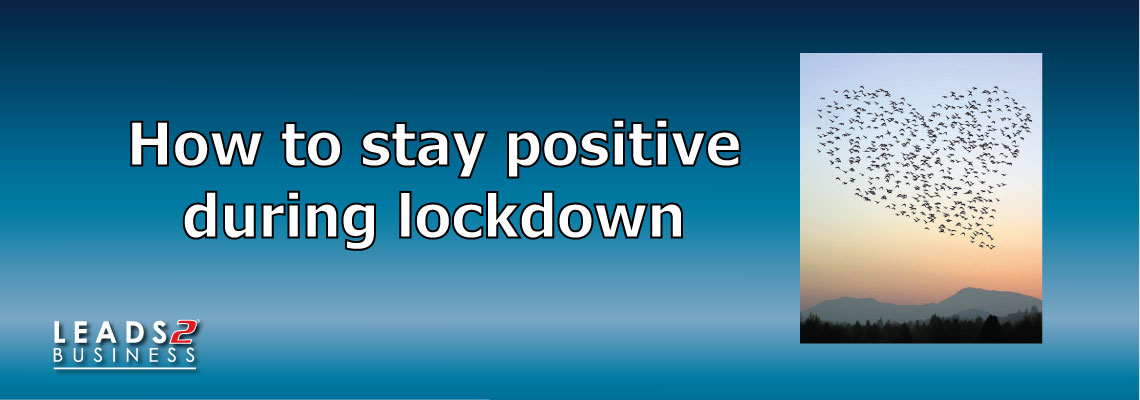
With all the tragic things that are happening in the world as a result of the Virus, now might seem like an unusual time to talk about being positive. Yet staying positive is a core ingredient in the recipe of successful coping in a crisis.
Now, more than ever is the time for us to be proactive about creating small moments of happiness daily.
Staying home is the absolute best thing we can do. By staying indoors, we’re hoping to flatten the curve. There’s no denying all this time indoors has given us time to think. Social media seems to make some of us nervous while others use it to spread positivity.
We’re in week two now, some of us feel calmer while others are starting to feel nervous, bored or worried and a whole lot of mixed emotions.
I decided to research: How to keep busy during Lockdown, How to stay positive and what to prepare for once everything starts to go back to normal again. Here are a few things you can try.
For your Business:
During this time, everyone is looking for ways to get more exposure and build up a pipeline for after Lockdown.
Use this opportunity to your advantage by retaining access to our Project and Tender Information plus Advertising opportunities to build up your pipeline and have potential clients gain exposure to your business.
Benefits of L2B during lockdown:
L2B Support Services & Staying Safe during Lockdown
It’s Business as Usual during Lockdown – We’re working remotely to ensure you get the latest up-to-date information on Project and Tender leads, wherever you are.
View and manage your information on our website from your laptop, computer or on your mobile device. Our Daily Advisory and News notification emails will be published and delivered directly to your inbox, daily.
We are Here for You: L2B staff will still be available via email, phone, Skype or Zoom for any training or queries you may have.
Work Remotely: Because of the Leads 2 Business design, working from home has never been easier. Have construction industry-related leads at your fingertips – all you need is access to the internet.
Plan for the Future: Now is the best time to prospect, build a huge pipeline and get ready for when things get back to normal. Utilize the time during lockdown to identify potential business for future months.
Stay Connected while working remotely during Lockdown
Don’t let COVID-19 affect your productivity
1. Utilise video solutions to get face time with colleagues, clients and prospects, we are all little deprived of human to human interaction and video contact will lift everyone’s mood and makes it feel more personal.
2. Stick to your schedule, don’t cancel meetings, instead try to adjust and make sure you stick to your daily work schedule, work your normal working hours, and take lunch when you normally would.
3. Talk to your bosses or boss, proactively schedule one on one time with your boss, this will keep you motivated and keep them up to date with everything you are up to.
4. Talk to a co-worker, video chat at least once a day, exchange tips on working from home and staying positive whilst doing so.
5. Reach out, if you find yourself struggling, don’t just move on or waste time trying to figure things out, your boss and co-workers are still there, so reach out and ask for help.
Mental Health Wellness Tips during Lockdown
For you and your family.
1. Stick to a routine: Go to sleep and wake up your normal time, write a schedule that is varied and includes time for work as well as family or own time. Being at home all the time can result in falling into some bad habits, such as avoiding regular breaks, working longer hours, and not taking regular screen breaks if you are working from home.
To avoid falling into a slump, try to establish a daily routine and stick to it.
Start your day at roughly the same time each day and make sure to set aside time for regular work breaks. Also stick to a routine with your children, who rely on routines constructed by others to make them feel safe and to know what comes next.
2. Dress for the social life you want, not the social life you have. Get showered and dressed in comfortable clothes, wash your face, brush your teeth. Take the time to do a bath or a facial. Put on some bright colours. It is amazing how our dress can impact our mood.
3. Pamper yourself, sometimes a bit of ‘me-time’ is sorely needed, so why not enjoy the ultimate relaxed night in and pamper yourself? Run a hot bubble bath, light some candles, and unwind with some music while enjoying a relaxing soak. Try some relaxation techniques
If you are having trouble switching off from everything, why not try some relaxation techniques.
4. Get out at least once a day, for at least thirty minutes. In the sun, in the garden. If you can. Spend time with your pets. Maybe take a drive to the shops. If you are concerned about contact, try first thing in the morning, or later in the evening, and try less travelled streets and avenues. If you are high risk or living with those who are high risk, open the windows and blast the fan. It is amazing how much fresh air can do for spirits.
5. Staying active, find some time to move each day, for at least thirty minutes. If you don’t feel comfortable going outside many YouTube videos offer free movement classes, and if all else fails, turn on the music and have a dance party! Staying active not only ensures you keep your body moving, but exercise also helps to reduce stress, boost your energy levels and keep you more alert.
6. Reach out to others, you guessed it, at least once daily for thirty minutes. Try to do FaceTime, Skype, phone calls, texting—connect with other people to seek and provide support. Don’t forget to do this for your children as well. Set up virtual playdates with friends daily via FaceTime, Facebook Messenger Kids, Zoom, etc—your kids miss their friends, too! Our sales team does the same, just to check in with each other. Many of us may be fond of messaging, but you can’t beat having a face-to-face conversation with someone. While that may not be possible for most now, you can keep in contact with your loved ones by alternative means and ditch the texts in favour of video calls.
7. Stay hydrated and eat well: This one may seem obvious, but stress and eating often don’t mix well, and we find ourselves over-indulging, forgetting to eat, and avoiding food. Drink plenty of water, eat some good and nutritious foods.
8. Savour the small moments: This can look different for everyone. Even during Lockdown, you still have many small moments to savour. The smell of coffee, the feel of the warm shower on your back and so on. When you stop to take in these moments, rather than let them rush by on automatic pilot, you are giving your brain a chance to process the pleasure, which boosts your serotonin – the feel-good neurotransmitter that helps elevate your mood and make you feel calm. Bubbles to blow or blowing watercolour on paper through a straw are visually appealing as well as helps to control breathing. Mint gum, Listerine strips, ginger ale, ice packs, and cold are also good for anxiety regulation. For children, it is great to help them create a self-regulation comfort box (often a shoebox or bin they can decorate) that they can use on the ready for first aid when overwhelmed.
9. Strengthen your connections: For those of us in family lockdown, now is the opportunity to spend quality time with our loved ones. Take the time to hug your kids or partner, look them in the eyes, have long conversations with them – all of these gestures promote closeness and also boost your oxytocin, which is a hormone that bonds people and also has a calming effect on your body. When your oxytocin levels spike, they tell your body to switch off cortisol, the stress hormone. Children will rarely communicate how they are feeling but will often make a bid for attention and communication through play. Understand that play is cathartic and helpful for children—it is how they process their world and problem solve, and there’s a lot they are seeing and experiencing in the now.
10. Find your own retreat space: Space is at a premium, particularly with city living. Think through your own separate space for work and for relaxation. For children, help them identify a place where they can go to retreat when stressed. You can make this place cosy by using blankets, pillows, cushions, scarves, beanbags, tents, and “forts”. It is good to know that even when we are on top of each other, we have our own special place to go to be alone.
11. Limit social media and COVID conversation: One can find tons of information on COVID-19 to consume, and it changes minute to minute. The information is often sensationalized, negatively skewed, and alarmist. Find a few trusted sources that you can check in with consistently, limit it to a few times a day, and set a time limit for yourself on how much you consume. Keep news and alarming conversations out of earshot from children—they see and hear everything and can become very frightened by what they hear.
12. Notice the good in the world, the helpers: There are also a ton of stories of people sacrificing, donating, and supporting one another in miraculous ways. It is important to counterbalance the heavy information with hopeful information. Appreciate those who are working to keep us safe. Look for the good in others when we tune into these positive and pro-social aspects of the crisis, we are united in hope.
13. Help others: Find ways, big and small, to give back to others. Offer to grocery shop, check-in with elderly neighbours, write psychological wellness tips for others—helping others gives us a sense of agency when things seem out of control.
14. Organize your surroundings: In moments of big uncertainty and overwhelm, control your little corner of the world. Organize your bookshelf, purge your closet, put together that furniture, group your toys. It helps to anchor and ground us when the bigger things are chaotic.
15. Give yourself a project, find a long-term project to dive into. Having a fun project to focus on will not only help to keep you busy every day. Now is the time to learn how to play the keyboard, put together a huge jigsaw puzzle, paint a picture, read a new story, writing, gardening, crochet a blanket. Research has shown that repetitive movement (knitting, colouring, painting, clay sculpting, jump roping etc) especially left-right movement (running, drumming, skating, hopping) can be effective at self-soothing and maintaining self-regulation in moments of distress, find something that will keep you busy, distracted, and engaged to take breaks from what is going on in the outside world. Challenge yourself to learn how to cook something new!
16. Find lightness and humour in each day: Watch something funny each day: cat videos on YouTube, a stand-up show on Netflix, a funny movie—we all need a little comedic relief in our day, every day.
17. Reach out for help: If you are having difficulty coping, seek out help for the first time. There are mental health people on the ready to help you through this crisis. Your children’s teachers and related service providers will do anything within their power to help, especially for those parents tasked with the difficult task of being a whole treatment team to their child with special challenges. Seek support groups of fellow home-schoolers, parents, and neighbours to feel connected. There is help and support out there, any time of the day, although we are physically distant, we can always connect virtually.
18. Remind yourself daily that this is temporary: It seems during this lockdown that it will never end. It is terrifying to think of the road stretching ahead of us. Please take time to remind yourself that although this is very scary and difficult and will go on for an undetermined amount of time, it is a season of life and it will pass. We will return to feeling free, safe, busy, and connected in the days ahead.
19. Find the lesson: See the potential positive outcomes this can affect, the meaning and construction that can come out of destruction. What can each of us learn here, in big and small ways, from this crisis? What needs to change in ourselves, our homes, our business our communities, our nation, and our world?
20. Stay Positive and Stay Safe!
What is the first thing you’ll do once everything goes back to normal?
It’s a good question, to be honest. Now, life is pretty much on hold which doesn’t necessarily mean we’ll all be free to go about our days again straight away.
Perhaps, when we’re finally allowed back outside, we’ll start to appreciate the little things more.
Rearranging missed dates: Afternoon teas, baby showers, Braai with friends, cinema trips, eating out, theme park visits, weekends away, birthdays, anniversaries- whatever you’ve missed or had to sacrifice during lockdown- don’t let it be forgotten- rearrange it once you can and fill up your diary again.
Spending time with your friends: Because they are the family you choose and unfortunately can’t live with! You will be able to have a good catch up and an inevitable moan about the last few weeks.
Spending more time with the family that doesn’t live with you: If the lockdown has taught us anything, it’s the importance of family and being present with them. So, once we are all safe to get out and about again- spend more time with your family and don’t put off visits or give excuses, make the effort because you know what the alternative feels like now.
Comparing stories: We will all have lived through the same situation however everyone’s experiences will be very different. It’s important, once we can spend time with those outside the family home- to unpack the last few weeks/months by talking it out with others.
Booking a holiday: If you have holidays left at the end of lockdown, make sure you use them wisely. Given the amount of time you will have spent at home, you might want to fly far away or do day trips every day- whatever you prefer, you have earned a well-needed break from the nest.
Get back to the Gym: Being active and join your normal Pilates or dance classes, or any activity that provides classes.
Getting back to work: Enjoy your office space again. Working all those leads you have compiled.
Sources:
Cherry Professional
India Today
Edinburgh News
Taggbox
To view more Articles, please visit our Leads 2 Business Blog.
If you are interested in becoming one of our subscribers, please visit Leads 2 Business.
To view notes with screenshots on how to use our website, please visit Leads 2 Business Wiki.
About Christine Brooks
My journey started in 2015 with Leads 2 Business, as an Account Executive, and gradually grown to take the role of being the Client Liaison Officer (CLO) since 2018. Assisting in the delivery of our services and insuring our clients expectations and requirements are exceeded.









agenliga
Thanks for sharing your thoughts on kelemahan mesin dingdong kelinci.
Regards
Sasha Anderson
Good Day,
Thanks we value your feedback.